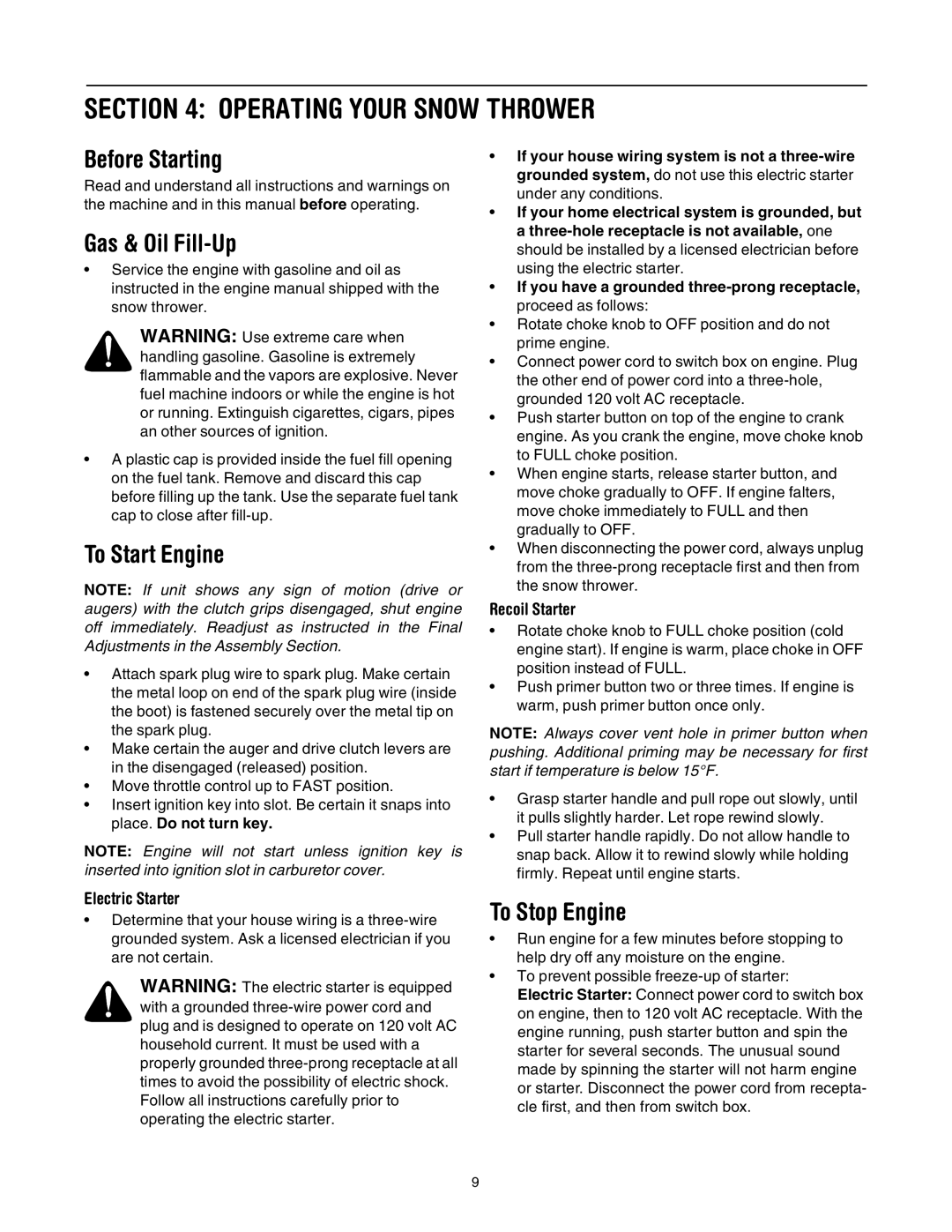
SECTION 4: OPERATING YOUR SNOW THROWER
Before Starting
Read and understand all instructions and warnings on the machine and in this manual before operating.
Gas & Oil Fill-Up
•Service the engine with gasoline and oil as instructed in the engine manual shipped with the snow thrower.
WARNING: Use extreme care when handling gasoline. Gasoline is extremely flammable and the vapors are explosive. Never fuel machine indoors or while the engine is hot or running. Extinguish cigarettes, cigars, pipes an other sources of ignition.
•A plastic cap is provided inside the fuel fill opening on the fuel tank. Remove and discard this cap before filling up the tank. Use the separate fuel tank cap to close after
To Start Engine
NOTE: If unit shows any sign of motion (drive or augers) with the clutch grips disengaged, shut engine off immediately. Readjust as instructed in the Final Adjustments in the Assembly Section.
•Attach spark plug wire to spark plug. Make certain the metal loop on end of the spark plug wire (inside the boot) is fastened securely over the metal tip on the spark plug.
•Make certain the auger and drive clutch levers are in the disengaged (released) position.
•Move throttle control up to FAST position.
•Insert ignition key into slot. Be certain it snaps into place. Do not turn key.
NOTE: Engine will not start unless ignition key is inserted into ignition slot in carburetor cover.
•If your house wiring system is not a
•If your home electrical system is grounded, but a
•If you have a grounded
•Rotate choke knob to OFF position and do not prime engine.
•Connect power cord to switch box on engine. Plug the other end of power cord into a
•Push starter button on top of the engine to crank engine. As you crank the engine, move choke knob to FULL choke position.
•When engine starts, release starter button, and move choke gradually to OFF. If engine falters, move choke immediately to FULL and then gradually to OFF.
•When disconnecting the power cord, always unplug from the
Recoil Starter
•Rotate choke knob to FULL choke position (cold engine start). If engine is warm, place choke in OFF position instead of FULL.
•Push primer button two or three times. If engine is warm, push primer button once only.
NOTE: Always cover vent hole in primer button when pushing. Additional priming may be necessary for first start if temperature is below 15°F.
•Grasp starter handle and pull rope out slowly, until it pulls slightly harder. Let rope rewind slowly.
•Pull starter handle rapidly. Do not allow handle to snap back. Allow it to rewind slowly while holding firmly. Repeat until engine starts.
Electric Starter
•Determine that your house wiring is a
WARNING: The electric starter is equipped with a grounded
To Stop Engine
•Run engine for a few minutes before stopping to help dry off any moisture on the engine.
•To prevent possible
Electric Starter: Connect power cord to switch box on engine, then to 120 volt AC receptacle. With the engine running, push starter button and spin the starter for several seconds. The unusual sound made by spinning the starter will not harm engine or starter. Disconnect the power cord from recepta- cle first, and then from switch box.
9
